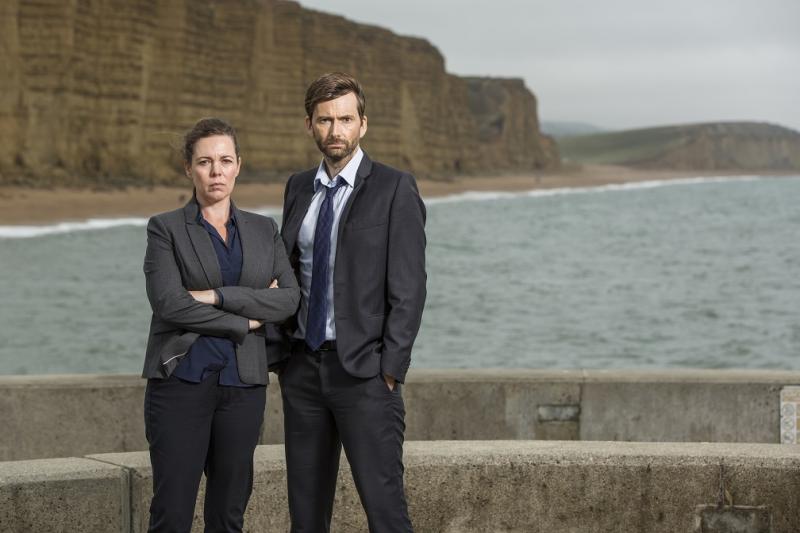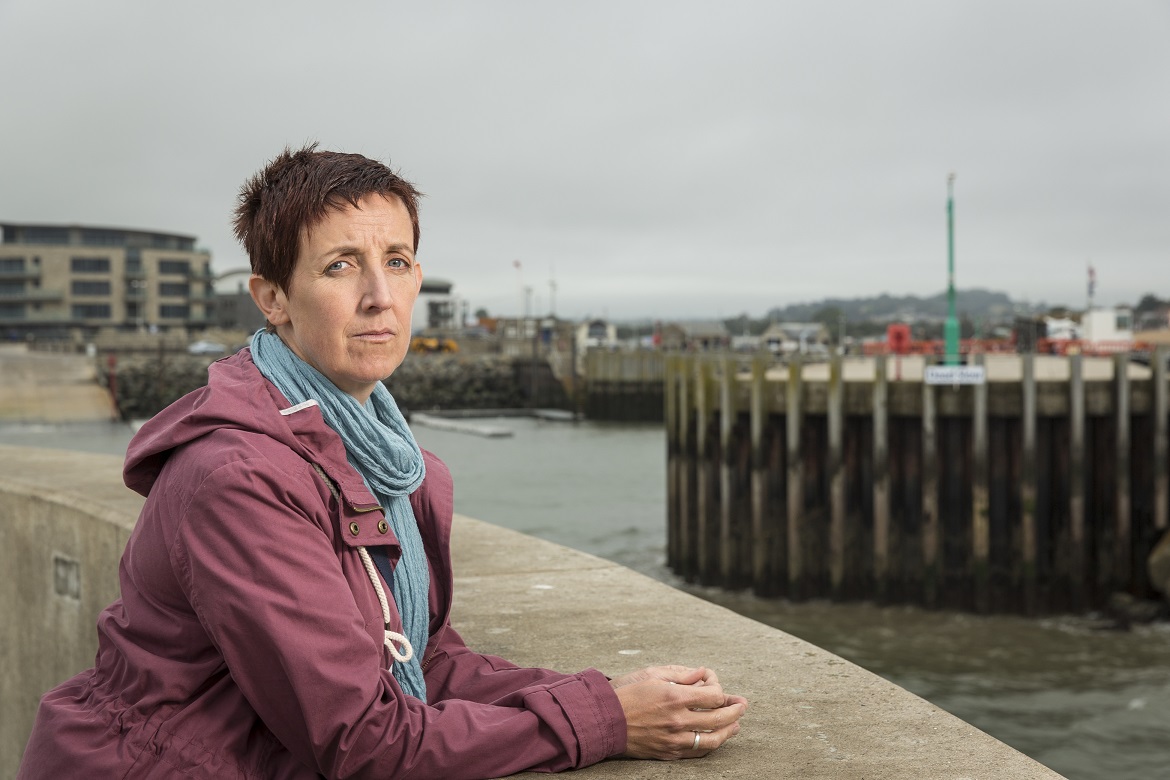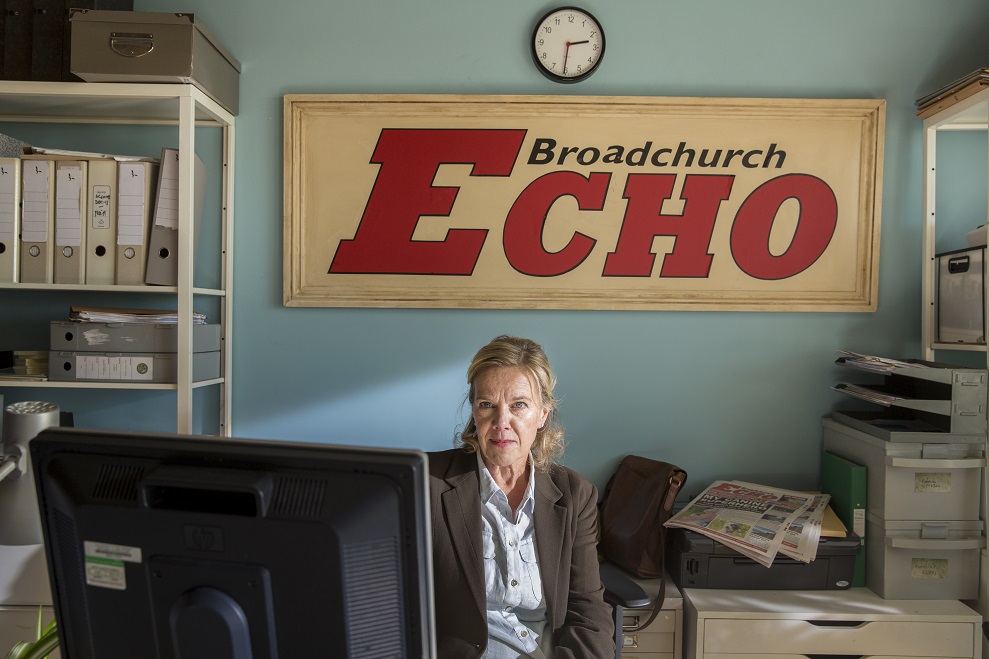Broadchurch review - the final reckoning | reviews, news & interviews
Broadchurch review - the final reckoning
Broadchurch review - the final reckoning
Farewell to the nation's favourite hinges on surprise

“Take your pick. Who shall we talk to first?” DI Alec Hardy (David Tennant) and DS Miller (Olivia Colman) had their three prime suspects waiting for them in custody.
On the absolute plus side was the handling of the subject matter. Following extensive consultation and research with women’s organisations and other bodies working in the area of rape, the production carefully and responsibly depicted “best practice” in terms of what happens when a woman reports rape to the police. Furthermore, in stark contradiction to much contemporary drama (The Fall, anyone?) the result was the depiction of an upsetting scenario that achieved power by the decision not to show and dwell upon the violence and violation, but by focusing instead on the effect on the victim via the superbly calibrated performance of Julie Hesmondhalgh as wounded and baffled Trish Winterman (pictured below).
 Tennant and Colman continued displaying their considerable acting chops, too. Their amusingly brusque double-act swiftly darkened into cold rage, vocalised with savage, bitter clarity by Tennant and shown in astonishingly expressive reaction shots from Colman as she faced the helpfully lucid and conveniently explanatory self-justifications of the psychopath finally revealed to be the ringleader.
Tennant and Colman continued displaying their considerable acting chops, too. Their amusingly brusque double-act swiftly darkened into cold rage, vocalised with savage, bitter clarity by Tennant and shown in astonishingly expressive reaction shots from Colman as she faced the helpfully lucid and conveniently explanatory self-justifications of the psychopath finally revealed to be the ringleader.
Leaving aside the multiple implausibilities of series two, not least the shoehorning in of Hardy’s crucial backstory that had previously never been referred to, we knew writer/creator Chris Chibnall had the potential to deliver the goods overall. After all, he had done such a memorable job of holding viewers through the intense slow burn in the surprise hit that was series one. From the toneless melancholy of Ólafur Arnalds’ sub-The Bridge theme tune onwards, it was clear that he was aiming for “scandi-noir in Dorset”. That, and the steady progression from one suspect to the next in the manner created and perfected by The Killing.
Whodunnits work via the withholding of information. Series one worked so well because its drip-drip reveal of secrets and lies unearthed more and more about links between characters. That simultaneously took us ever closer to the killer while constantly deepening our understanding of an entire community. This time out, the more even-handed handing out of suitably suspicious behaviour and lies only served to isolate characters with whom we had little connection. The nadir was the sequence near the close of the penultimate episode where all the key suspects were shown in a shameless summary montage.
 Worse, having been teased by our witnessing of each of the suspects being grilled, having the perpetrator revealed as the one person who had never been a suspect was irritatingly dissatisfying. If you cannot work out whodunnit from the evidence before you, it feels like cheating. At moments like that it was hard not to recall theartdesk review four years ago which observed after the closing caption announcing the show’s return: “Surely they’re not teeing it up as Midsomer Murders-on-Sea?” Yet would Midsomer stretch credulity to the point where a woman at the rank of Detective Constable, ie no rookie, would potentially wreck a case by not thinking to mention that (nicely subdued) Lenny Henry's character was her father?
Worse, having been teased by our witnessing of each of the suspects being grilled, having the perpetrator revealed as the one person who had never been a suspect was irritatingly dissatisfying. If you cannot work out whodunnit from the evidence before you, it feels like cheating. At moments like that it was hard not to recall theartdesk review four years ago which observed after the closing caption announcing the show’s return: “Surely they’re not teeing it up as Midsomer Murders-on-Sea?” Yet would Midsomer stretch credulity to the point where a woman at the rank of Detective Constable, ie no rookie, would potentially wreck a case by not thinking to mention that (nicely subdued) Lenny Henry's character was her father?
Moreover, this was Midsomer with more on its mind, mostly the tying-up of loose ends of every other character. Jodie Whittaker and Andrew Buchan continued to impress as parents struggling with the aftermath of the death of their son. But even Carolyn Pickles (pictured above) and Mariah Gale couldn’t humanise horribly flat exposition in wholly unnecessary scenes between local editor Maggie Radcliffe and her heartless young boss Caroline. The writing for them was so schematic Chibnall could sell their scenes off separately as “An Introduction to the Dreadful State of Journalism”.
Fans sorry to see the series go will have lapped up the sentimental succession of false endings where we effectively waved goodbye to each and every character. With Chibnall heading off to be showrunner of Doctor Who, Broadchurch is definitely no more. It’s a shame the grand finale failed to match the strength of this last series’ affecting opening episodes.
rating
Share this article
The future of Arts Journalism
You can stop theartsdesk.com closing!
We urgently need financing to survive. Our fundraising drive has thus far raised £49,000 but we need to reach £100,000 or we will be forced to close. Please contribute here: https://gofund.me/c3f6033d
And if you can forward this information to anyone who might assist, we’d be grateful.

Subscribe to theartsdesk.com
Thank you for continuing to read our work on theartsdesk.com. For unlimited access to every article in its entirety, including our archive of more than 15,000 pieces, we're asking for £5 per month or £40 per year. We feel it's a very good deal, and hope you do too.
To take a subscription now simply click here.
And if you're looking for that extra gift for a friend or family member, why not treat them to a theartsdesk.com gift subscription?
more TV
 The Diplomat, Season 3, Netflix review - Ambassador Kate Wyler becomes America's Second Lady
Soapy transatlantic political drama keeps the Special Relationship alive
The Diplomat, Season 3, Netflix review - Ambassador Kate Wyler becomes America's Second Lady
Soapy transatlantic political drama keeps the Special Relationship alive
 The Perfect Neighbor, Netflix review - Florida found-footage documentary is a harrowing watch
Sundance winner chronicles a death that should have been prevented
The Perfect Neighbor, Netflix review - Florida found-footage documentary is a harrowing watch
Sundance winner chronicles a death that should have been prevented
 Murder Before Evensong, Acorn TV review - death comes to the picturesque village of Champton
The Rev Richard Coles's sleuthing cleric hits the screen
Murder Before Evensong, Acorn TV review - death comes to the picturesque village of Champton
The Rev Richard Coles's sleuthing cleric hits the screen
 Black Rabbit, Netflix review - grime and punishment in New York City
Jude Law and Jason Bateman tread the thin line between love and hate
Black Rabbit, Netflix review - grime and punishment in New York City
Jude Law and Jason Bateman tread the thin line between love and hate
 The Hack, ITV review - plodding anatomy of twin UK scandals
Jack Thorne's skill can't disguise the bagginess of his double-headed material
The Hack, ITV review - plodding anatomy of twin UK scandals
Jack Thorne's skill can't disguise the bagginess of his double-headed material
 Slow Horses, Series 5, Apple TV+ review - terror, trauma and impeccable comic timing
Jackson Lamb's band of MI5 misfits continues to fascinate and amuse
Slow Horses, Series 5, Apple TV+ review - terror, trauma and impeccable comic timing
Jackson Lamb's band of MI5 misfits continues to fascinate and amuse
 Coldwater, ITV1 review - horror and black comedy in the Highlands
Superb cast lights up David Ireland's cunning thriller
Coldwater, ITV1 review - horror and black comedy in the Highlands
Superb cast lights up David Ireland's cunning thriller
 Blu-ray: The Sweeney - Series One
Influential and entertaining 1970s police drama, handsomely restored
Blu-ray: The Sweeney - Series One
Influential and entertaining 1970s police drama, handsomely restored
 I Fought the Law, ITVX review - how an 800-year-old law was challenged and changed
Sheridan Smith's raw performance dominates ITV's new docudrama about injustice
I Fought the Law, ITVX review - how an 800-year-old law was challenged and changed
Sheridan Smith's raw performance dominates ITV's new docudrama about injustice
 The Paper, Sky Max review - a spinoff of the US Office worth waiting 20 years for
Perfectly judged recycling of the original's key elements, with a star turn at its heart
The Paper, Sky Max review - a spinoff of the US Office worth waiting 20 years for
Perfectly judged recycling of the original's key elements, with a star turn at its heart
 The Guest, BBC One review - be careful what you wish for
A terrific Eve Myles stars in addictive Welsh mystery
The Guest, BBC One review - be careful what you wish for
A terrific Eve Myles stars in addictive Welsh mystery
 theartsdesk Q&A: Suranne Jones on 'Hostage', power pants and politics
The star and producer talks about taking on the role of Prime Minister, wearing high heels and living in the public eye
theartsdesk Q&A: Suranne Jones on 'Hostage', power pants and politics
The star and producer talks about taking on the role of Prime Minister, wearing high heels and living in the public eye

Add comment